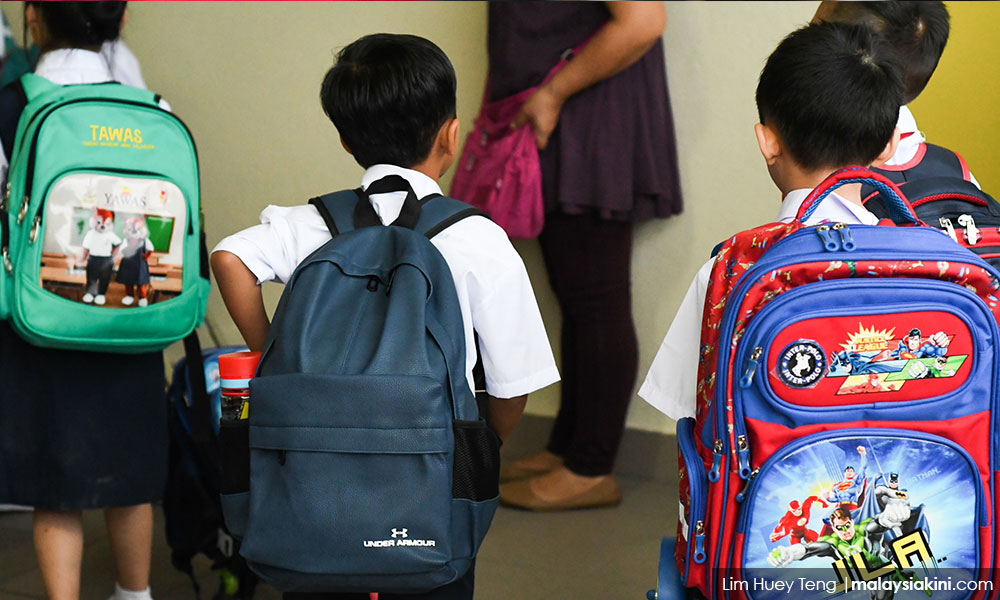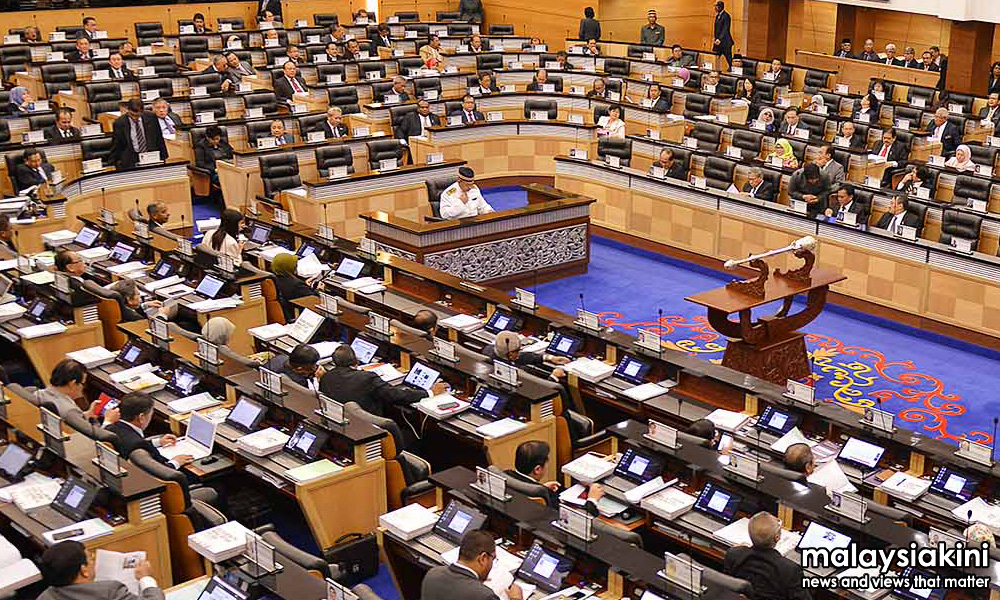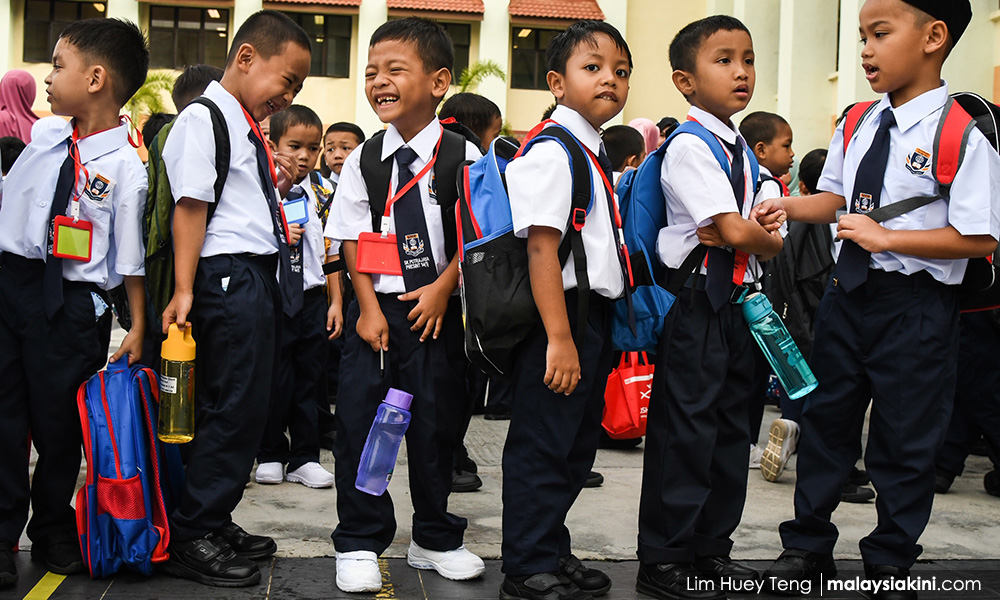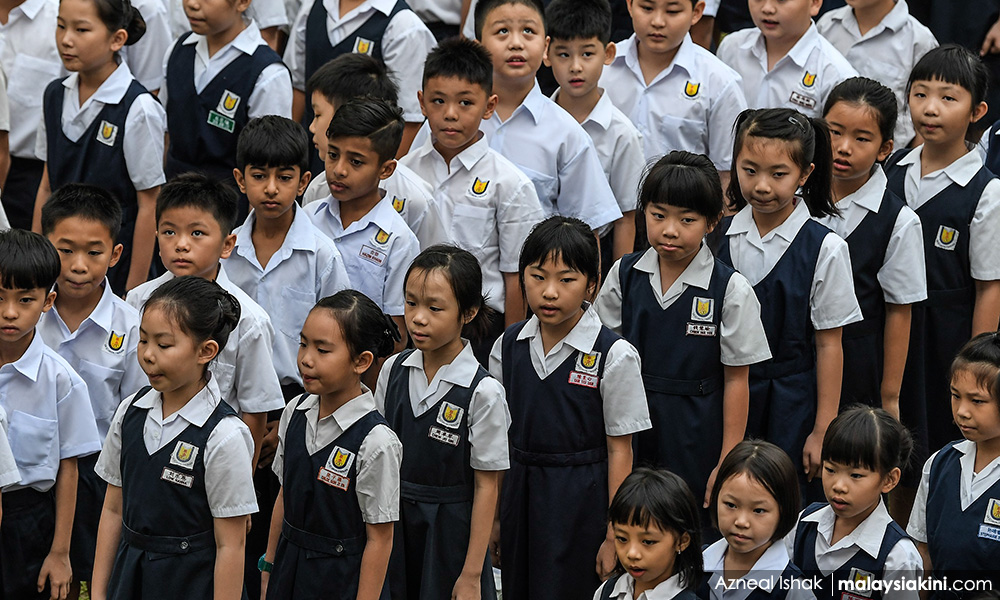Solving the heavy schoolbag issue isn't rocket science
Opinion |
Azly Rahman
Published: |
Modified:

COMMENT | We have a 20-year-old school dilemma treated as if we need rocket scientists to find a solution – the problem of heavy schoolbags, the 'payloads' our future astronauts are carrying.
Children carrying anything above 8kg is not good, as I recall an orthopaedic surgeon once saying in an interview. Even if it is lighter than that, not carrying it properly could result in injury.
My question is, what makes it so difficult to solve this problem? Often, we read about taskforces needing to be created to start thinking about approaching a solution.
Such taskforces will need special grants, and the solutions will still need "feedback from the public" (like black shoes, white socks). Then further research needs to be done, to see if the weight of the bags correspond with the need for children to do more work at home, and how this will contribute to the critical success of this or that programme and so on and so forth.
Then all these will be raised in cabinet meetings, and be again brought back and forth to the various levels of ministerial groups of decision makers, and suggestions passed down to district education heads, who will do more fact-finding, interviews, observations and await parental responses, and then go back to the ministry, which will report to the cabinet again, before it is brought to the next parliamentary debate.
There, opposition and supposition parties will spend hours debating on the acceptable weight of schoolbags, and then there will again be fierce arguments that will also spiral out of control, and the people will get emotional and then there will be walkouts and then the debate will be postponed to the next sitting… and then… and then… time waits for no man, no woman, no child, and then they grow up.
The loss
From 2000 to the 'great mythical visionary year' of 2020, the generation that carried heavy schoolbags will probably grow up in the footsteps of bodybuilders Malik Nor, Solomon Esmanto, and former Mr Universe Arnold Schwarzenegger (who did, of course, go on to have a political career).
Meanwhile, in advanced industrialised countries, we see children growing up to become the Mark Zuckerbergs, Jeff Bezoses and Elon Musks of the world, or top scientists, entrepreneurs, artists and humanists.
Education there is about exploring innovations and creating new artefacts, through cultivation of learning- and teaching-based (and not rote memorisation, which necessitates the burden of heavy books), but on what teachers need to do in order to manage advanced project-learning curriculum that requires excellent skills of classroom management and a classroom culture of high-level thinking.
Whatever happened to our cybernetics-inspired projects, such as smart schools and 1BestariNet, that ought to have existed under the grand design of the so-called Multimedia Super Corridor?
And now, we wish to embark upon another high-tech mass-consumption based project to catch up to the Internet of Things with fancy iPads, supplied by who knows-which-companies owned by political cronies, rather than forge a cooperative society that will benefit the children of poor communities.
The school
A school is a space of cognitive ecology, or as philosopher John Dewey would term it, a space of negotiation of knowledge, power and stimulation of the variety of 'intelligences' a child possesses – each to be discovered, developed to the fullest, and given the suggestion for guidance.
The classroom is an arena to allow the child’s cognition to celebrate, like in a carnival. Each classroom should be transformed into an organic and dynamic space of learning. The faces of enthusiasm, creativity, critical thinking and dynamism can tell us why the more we transform the classroom into an exciting place to be in, the more learning – directly, incidentally, and even vicariously – can happen.
What is our philosophy and psychology of schooling in our multicultural mix of things entire? The problem could be with teacher training and the profession itself, in the representation and misrepresentation of what it means to be a teacher.
The tool
Technology is just a tool. Our fascination seems to be with the rhetoric and jargon of progress – the models we do not understand, yet want to impose by borrowing lock, stock, and barrel. Culture, conditions, and criteria of school success we ignore or fail to understand.
Our Education Ministry wanting to suddenly introduce the teaching and infusing of artificial intelligence sounds postmodern and advanced, yet remains meaningless if the understanding of the culture, conditions and criteria of such implementation is non-existent.
A simple example of this flight of fancy is that we have not even decided, for reasons political, whether Mathematics and Science should first be taught in English, knowing that the language of AI, coding and quantum computing is not Malay or Arabic.
The pedagogy
We need to harness cultural creativity and intelligence. The basic issues of the foundations of education, namely race relations, ecology and the social ergonomics of schooling, are not yet resolved.
We do not have any plan for that crucial vision of multiculturalism. We do not even have a set of national core curriculum content standards to start a dialogue about what sustainable education means.
Our educational leaders in the ministry need to have a grasp of the concept of the architecture of knowledge and its relationship to the progress of nations. What this means, I will leave it up to these experts to interpret, since they are entrusted to be the futurists and pragmatists of the country and its children.
Will we continue to become a rote-learning nation? Or do we need a cognitively sustainable nation that creates innovators, inventors, and humanists, able to grasp the larger context of change, and how to manage change without the country rendered deranged?
The breeding grounds are our schools, and its extended domains of knowledge/power: home, neighbourhood, and society at large. These must be seen as a matrix of interdependent elements of how a child, a junior member society, acquires cultural knowledge, and how that knowledge is applied in a praxical mode in the process of being and becoming a good citizen and a productive member of society.
Again, this is not rocket science, requiring educational space scientists to figure out hidden formulas to launch successful educational missions.
Every teacher must think of himself and herself as managers and cultivators of learning – not as drill sergeants or correctional officers ordering children to do more homework and lug around more books, as if they are mere labourers building the next national monument to glorify this or that ruler.
This is what mental slavery in a world of rote-learning is about, especially with the glamorised yet hideous term we use in this post-humanist world: 'knowledge workers', who harvest information in a cybernetic world of servitude, in which the owners get to think with an iPad and the workers struggle with robots in some warehouse.
A solution
I’d say, leave the heavy books in the classroom. In a special locker. Leave some in the village library. Or in the elected representative's service centre, accessible daily.
Train teachers in managing teaching and learning, collaboratively. Have them master the art and science of teaching, holistically. Get schools to monitor the environment professionally, for student safety, while learning engagingly, understanding educational laws and its legal boundaries.
Give homework sparingly, only when necessary, giving time for the students to explore their hobbies. Finish tasks in the classroom efficiently.
Infuse project-based learning extensively. Stop enriching the multi-billion ringgit tuition industry. Have learners enjoy schools and be happy if that is going to be our new educational philosophy.
Our children are not bricklayers for the wealthy, They are the architects of the future. Theirs.





(2).jpg)
No comments:
Post a Comment